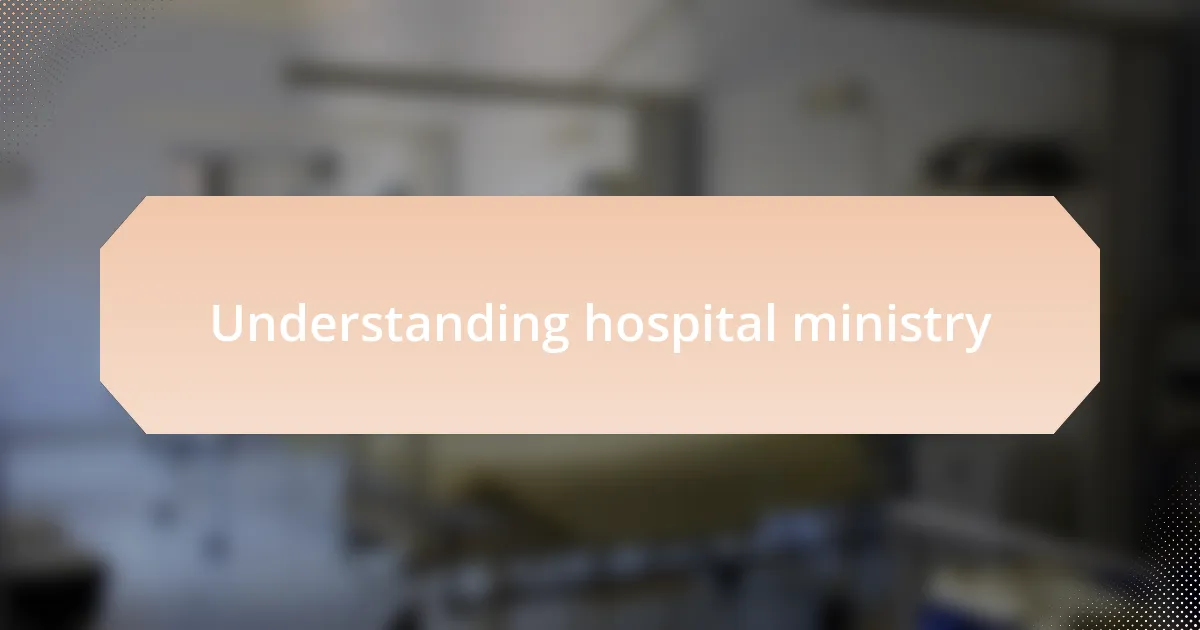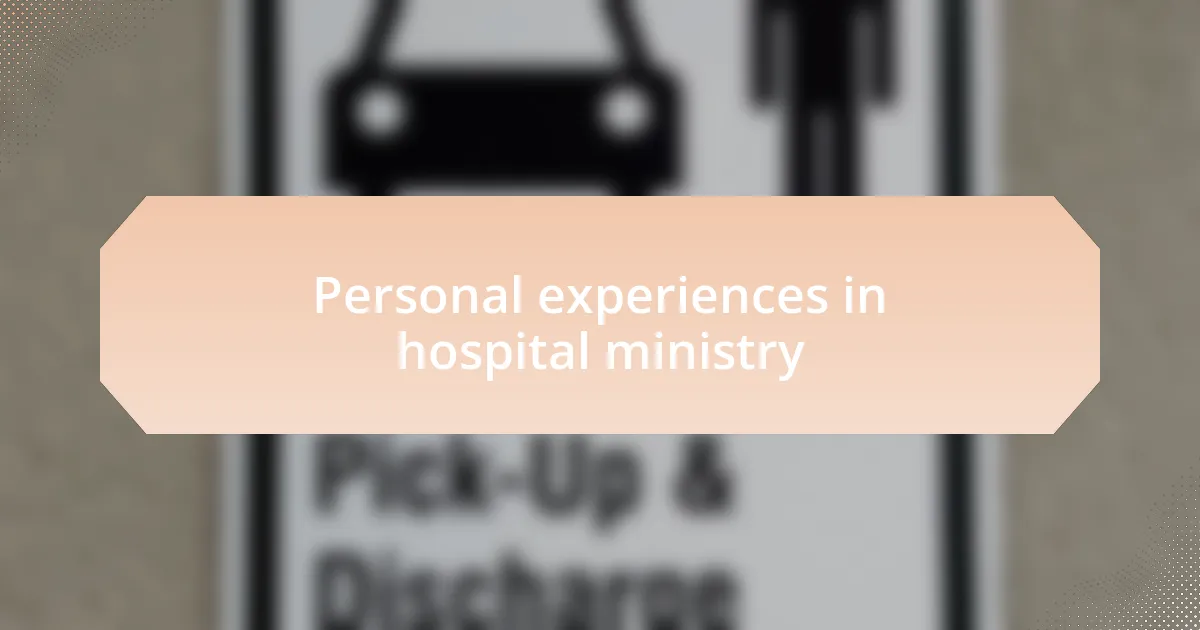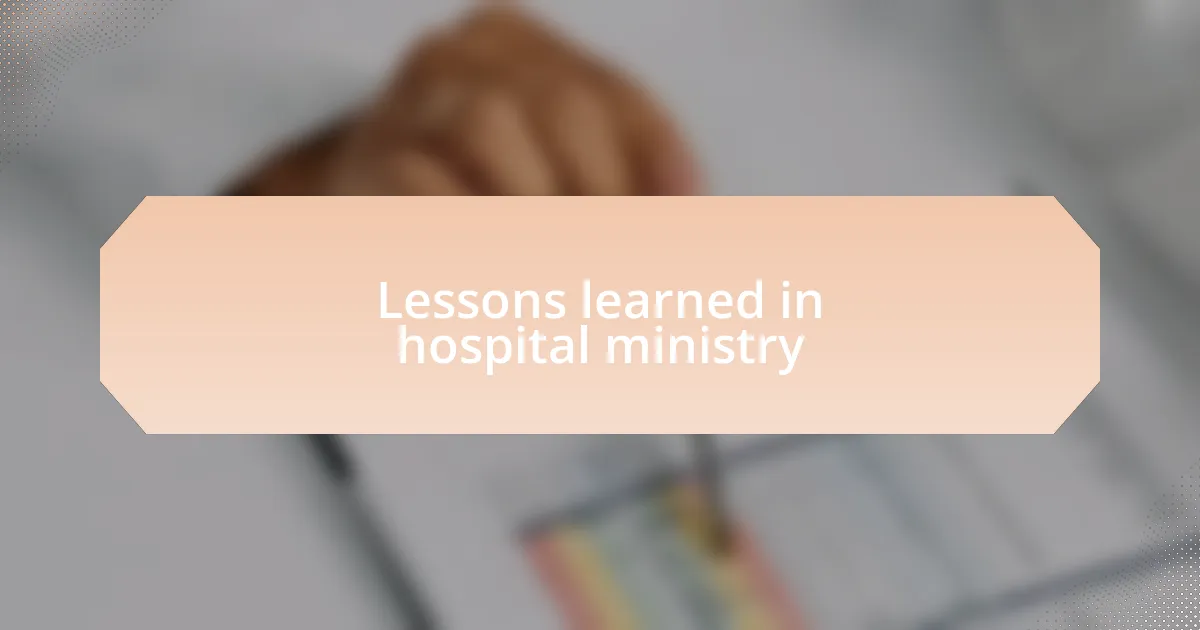Key takeaways:
- Hospital ministry involves providing emotional and spiritual support, creating connections that transcend physical healing.
- Spiritual care fosters hope and addresses deeper existential questions, enriching the healing experience for patients and caregivers.
- Key challenges include navigating family dynamics, limited time for support, and the need for cultural sensitivity to enhance compassionate care.
- Essential skills for effective hospital ministry include active listening, emotional support, and adaptability to meet the unique challenges of each situation.

Understanding hospital ministry
Hospital ministry is more than merely providing support; it’s about creating a space where healing extends beyond the physical. I remember my first encounter in a hospital chapel, feeling the palpable tension in the air. How can we truly offer comfort when faced with such deep vulnerability?
Engaging with patients and families requires a sensitivity that often comes with experience. I’ve learned that simply being present can communicate more than words ever could—it’s in that shared silence that connections often deepen. Have you ever noticed how a gentle touch or a soft gaze can convey understanding more powerfully than anything spoken?
I’ve discovered that hospital ministry also involves navigating complex emotions, both for the patients and ourselves. There are moments when I felt overwhelmed by the enormity of suffering, and grappling with my own feelings was part of the journey. How do we cultivate resilience in the face of such challenges? I’ve found that leaning on the community, sharing experiences, and engaging in self-reflection can illuminate the path forward.

Importance of spiritual care
Recognizing the importance of spiritual care in hospitals truly transformed my perspective on healing. I once sat with a patient who had lost hope, and after just a few shared words about faith and personal struggles, I witnessed a flicker of light in their eyes. It’s amazing how spiritual care can foster hope when everything else seems bleak. How can we underestimate the power of faith during such vulnerable times?
Spiritual care is not just about addressing religious beliefs; it’s about acknowledging the deeper questions of existence that illness can bring up. I remember speaking with a family who felt lost in the chaos of treatment decisions. Together, we navigated their fears and uncertainties, and I saw them begin to reconnect with what truly mattered to them. In those moments, I realized how vital it is to facilitate conversations around purpose and meaning, even in the darkest hours.
Ultimately, spiritual care enriches the entire healing experience for both patients and caregivers alike. I’ve often found solace in the shared stories of resilience and despair; they remind me of our collective humanity. Isn’t it powerful to realize that in providing spiritual support, we are also nurturing our own spirits? This reciprocal relationship highlights the profound impact spiritual care has within hospital ministry.

Key challenges in hospital ministry
Key challenges in hospital ministry can sometimes feel overwhelming. One of the most significant hurdles I encountered was navigating the complex dynamics of family relationships during a patient’s hospitalization. There was one particular instance when a family was split on treatment decisions, leading to emotional turmoil. How could I support the patient and their family while ensuring everyone felt heard and respected? It reminded me that the emotional stakes are incredibly high in these settings, and establishing trust is essential.
Another challenge is the limited time given to practitioners. I recall numerous occasions when I felt the pressure of a ticking clock during my visits. Often, my conversations with patients were truncated by the demands of their medical care. It’s disheartening to think that a meaningful spiritual dialogue could be interrupted by a busy schedule. How do we, as caregivers, balance the urgency of medical needs with the depth of spiritual listening? It’s a tightrope walk that requires constant awareness and adaptability.
Cultural sensitivity is also a vital issue in hospital ministry. I once worked with a patient from a diverse background whose beliefs about healthcare starkly contrasted with the typical medical approach. This experience taught me the importance of being open-minded and genuinely curious about different faith expressions and traditions. How do we embrace such diversity without imposing our own beliefs? Understanding and respecting these differences can create a much more compassionate and inclusive environment for all involved.

Skills for effective hospital ministry
Effective hospital ministry requires strong communication skills. I remember a time when a patient was overwhelmed with anxiety about their surgery. I learned that just listening and validating their feelings made a significant difference. How can simple, empathetic conversations transform a patient’s experience? It’s all about building connections through genuine dialogue.
Another crucial skill is the ability to provide emotional support. During one visit, I encountered a family grieving the loss of a loved one. I found that offering a safe space to express their grief allowed them to process their emotions better. It made me realize that sometimes, the most valuable thing we can offer isn’t advice but simply our presence. How often do we forget that just being there can be enough for someone in pain?
Lastly, adaptability is key in hospital ministry. I distinctly recall an occasion where the situation changed rapidly, and my planned approach was no longer suitable. I had to pivot quickly and respond to the needs of that moment. This taught me that flexibility is essential; each day brings unique challenges that require us to be open to new solutions. How can we prepare ourselves for the unexpected? Embracing change with a positive mindset can equip us to meet any challenge head-on.

Personal experiences in hospital ministry
One unforgettable experience in hospital ministry was when I visited a young patient battling a chronic illness. I vividly remember how her eyes lit up when I shared stories about my own struggles and triumphs. That connection fostered a sense of hope and understanding that changed the atmosphere in the room. Isn’t it fascinating how our shared experiences can create a bridge of comfort?
I also had a moment that challenged my perspective on the role of a hospital minister. There was a time when I focused intensely on delivering specific prayers or readings, but I found that what the patients needed most was simple companionship. Just sitting quietly with them, acknowledging their fears without trying to fix anything, offered immense solace. How often do we overlook the power of presence over performance?
Furthermore, I experienced the profound impact of cultural sensitivity during one of my visits. I was attending to a patient from a different cultural background, and I learned the importance of understanding their beliefs and values. That day, I gained insights into their practices, which allowed me to tailor my support in a way that felt respectful and relevant. Have you ever considered how cultural understanding can enhance the care we provide? It opened my eyes to the vital role of empathy in hospital ministry.

Lessons learned in hospital ministry
One of the most significant lessons I learned in hospital ministry is the profound impact of active listening. I recall a visit where a mother was overwhelmed with worry for her child. As I sat with her, I realized that my role was less about offering solutions and more about creating a space where she felt heard. Have you ever found that simply being present in someone’s pain can be a healing balm on its own? It’s truly remarkable how a genuine conversation can foster trust and a sense of safety.
Another realization struck me when I reluctantly accepted a last-minute shift. I expected to encounter routine, yet I found myself visiting a terminally ill patient who had almost given up hope. In our discussion, he shared his unfulfilled dreams and I could see the flame of hope flicker back to life as we laughed together over shared memories. Don’t you think that humor, even in the darkest times, can shine a light that guides us through adversity? This experience taught me that joy and sorrow often coexist, and embracing both can profoundly uplift those we serve.
I also discovered the importance of self-care within the ministry. One week, I found myself emotionally drained after several intense visits. Reflecting on my own well-being made me realize that to support others, I needed to prioritize my own mental and spiritual health. How can we effectively minister to others if we neglect our own needs? That lesson has since guided me to incorporate practices like reflection and prayer into my routine, allowing me to serve others more sustainably.